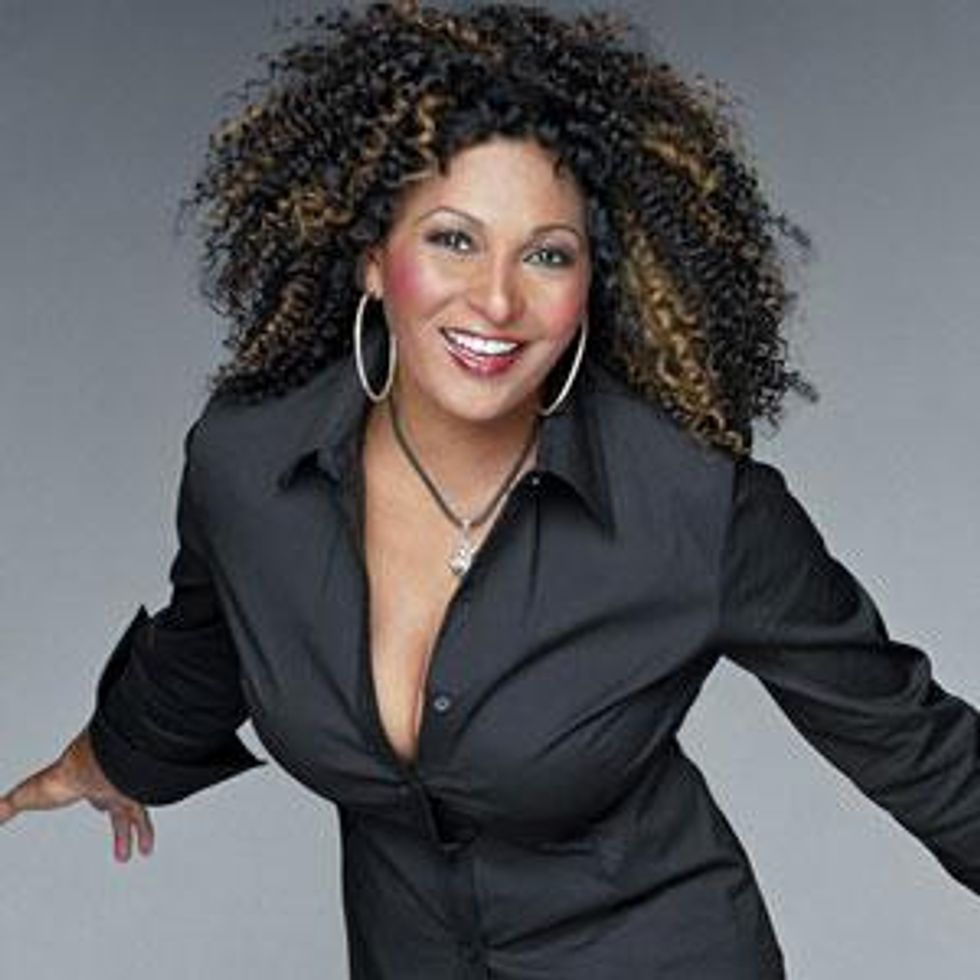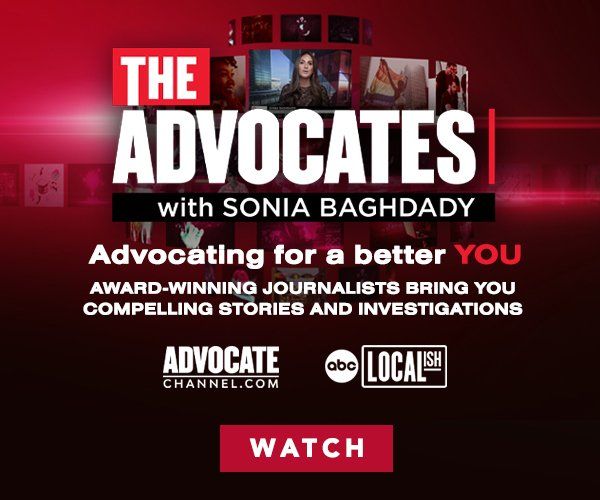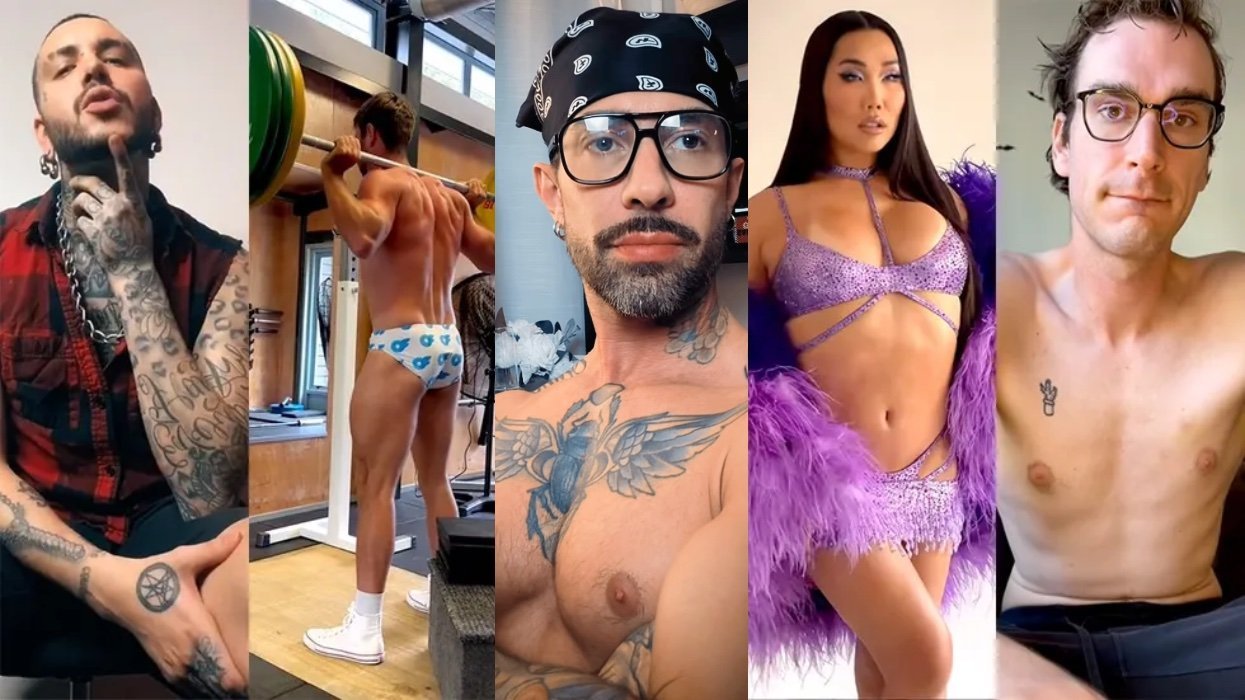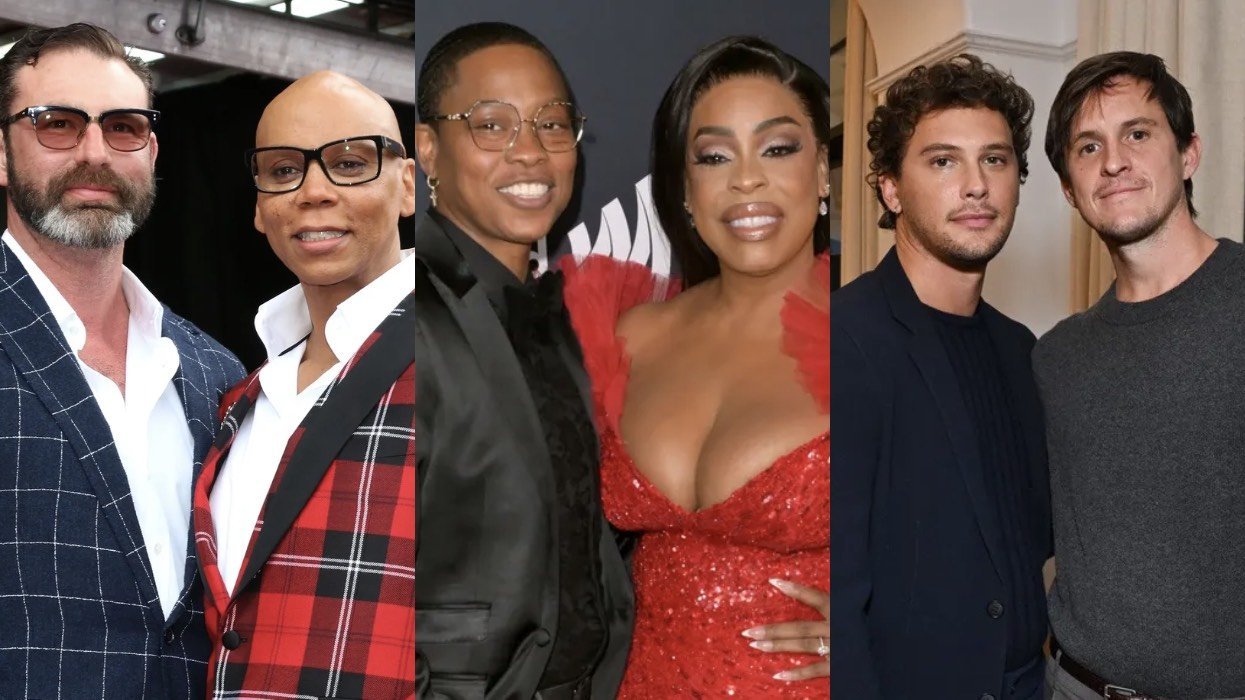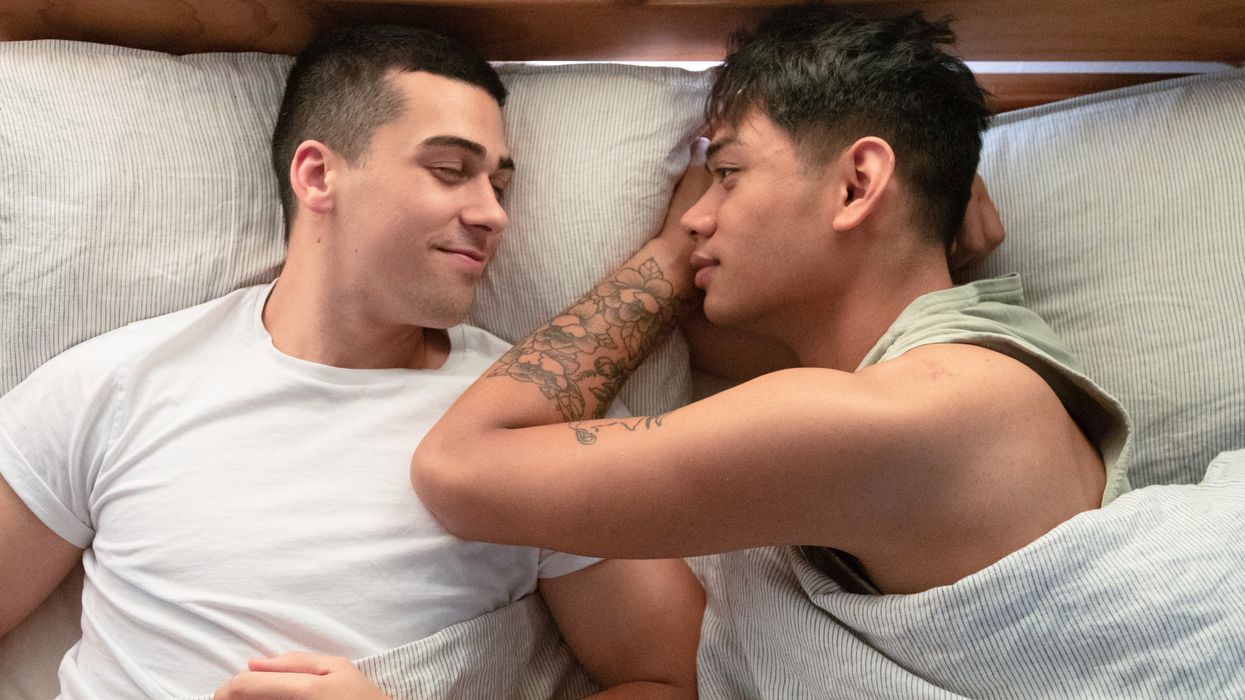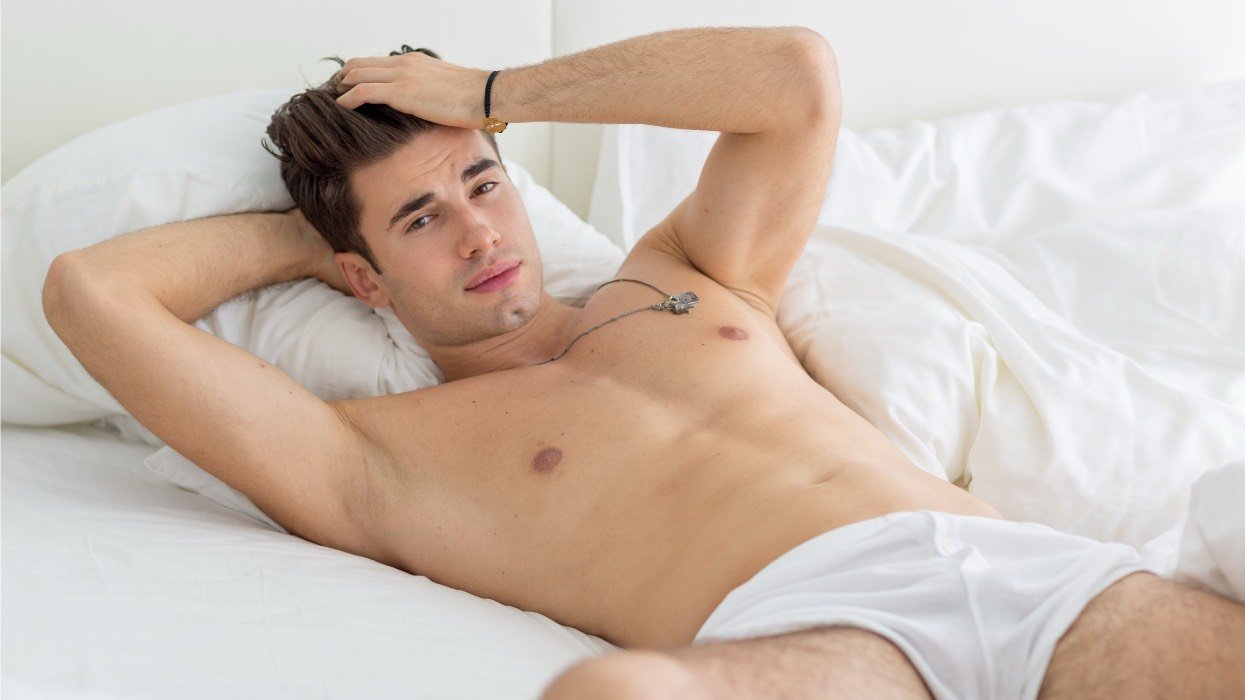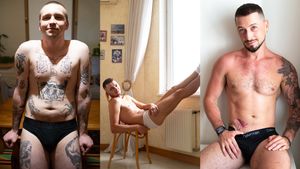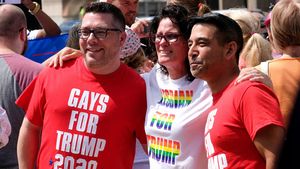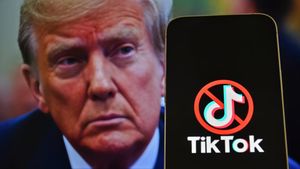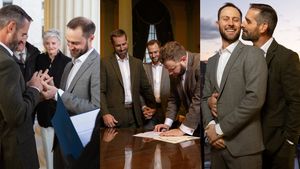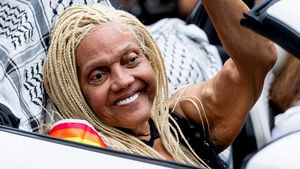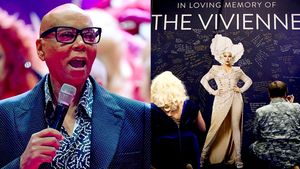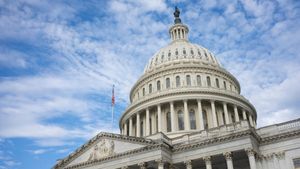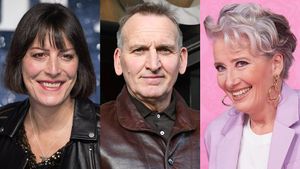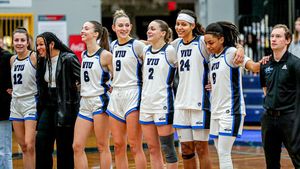There are few women in Hollywood hotter than Pam Grier. The legendary actress who broke barriers with her turn as a blacksploitation superstar in the 1970s, in films like Coffy, Foxy Brown, and Sheba, Baby is long heralded as the first female action hero. From Fort Apache the Bronx to Jackie Brown Grier has changed every film she’s starred in. But it was her role in the groundbreaking Showtime series, The L Word, that brought her a whole new audience. She’s done plenty since the show stopped taping in 2009 (turning up as a villain on Smallville and Julia Roberts’ bud on Larry Crown, and releasing a tell-all memoir Foxy: My Life in Three Acts). But as Grier reminds us, The L Word isn’t really over, nor is it off the air: it currently airs on Logo and in 46 different countries that have syndicated it, it’s spin off reality show The Real L Word is prepping season three, and the entire glorious series, a cast reunion, and several rarities from the iconic show have been released on the The L Word Complete Series DVD Collection.
For Grier, the show was a catalyst to LGBT activism, and the actress has shown up at fundraisers, celebrations, and protests in support of LGBT rights, and often acts as a bridge between the straight African-American community and the LGBT world. In recent months, she was awarded the Entertainment AIDS Alliance Visionary Award and she appeared in support of the National Gay and Lesbian Task Force (“I really support them because they really fight for injustices. They go down there and they really kick ass,” she says of NGLTF). She’s also a spokesperson for Dining Out for Life, a gourmet food movement that raises money for AIDS service organizations. We caught up with her to talk about TV badonkadonk, Twitter, and how The L Word changed the world.
So The L Word was one of the all-time highest rated shows on Showtime.
It was? Past tense?
No, it is.
[Laughs] There you go!
What impact do you think the show had on the world?
It is still continuing. In education, it’s a formidable tool of information, for families from diverse backgrounds, cultures, class — it's still resonating, it's still very, very popular. And the fact that so many woman — and because of its overall theme, and men, gay men, bisexual and transgender men — have been able to be more authentic with themselves and more comfortable, and people who were ignorant or not knowing would find a comfort zone.
It brought up issues we hadn’t seen on TV.
Even myself, I had no idea of the many injustices in the gay community, whether its the adoption of children, marriage, benefits, estates. But a lot of it was the assumption in the hetero world, in the straight world — my mother and I, we just assumed that gay people received automatically, by birthright, the same benefits as us.
You said your mother and her friends discussed the show.
My mom being 82, and being very wise and cultural, she often assumed that there shouldn't be a problem [with being gay]. My mom is an academic and she wants to go back to school at 82, because of [her love of] information. But I was relaying this to her and her friends who had gay children and still didn't have an idea of how to approach them or let then know it was OK [to reconnect] after they kicked them out 15 years ago. How did they reconcile the fact that they are more tolerant and they understand and that it is OK now? As a matter of fact, you know that isyour child. It used to be that these people, my mom's generation would sit and have discussions … about how so many people haven't been able to, or are uncomfortable, or will not be ever ready to come out and just be themselves. So to have 82-year-old women discuss that is great.
More on next page...
\\\
(continued)
I remember how African-American queer women were so excited to see you in person as well as on the show.
I was invited to a wonderful, wonderful symposium in Las Vegas of African-American lesbian woman. It was a community, it was an organization, very prolific, very successful, very informative — and it was so amazing that they could have this seminar and have a great retreat in Las Vegas. I know often in African-American communities… they are still uncomfortable [with homosexuality] in many areas. I think they are more religious or old-school, if you will. Eventually, as Howard Zinn — the social activist, who was the first white professor at Spellman College, which was an African-American woman's college — said in a statement that has always lingered with me, it is something very special, he said: “Small acts, multiplied by millions, can transform the world.”
That’s really resonant.
And it has been a part of my families’ mantra, small acts, and if The L Word in relative terms was a small act, look at the millions of people it reached. It’s playing in 20 some countries. I get emails from Finland, Brazil, from gay women who love The L Word. And my mom asks me, “Are you shocked if a lesbian woman gives you a compliment?” I'm like, “No, its flattering, can't do much, but its flattering.”
It means you connected with lesbian viewers.
It’s the fact that we highlighted the life of many women, so other people can herald the greatness of people. That is why I had to be a part of it. And Jennifer Beals, my sistah, wanted me to play her sister in the show, and I am so grateful for that because I would not have known what I know. I've met so many incredible people who are my friends for life. And they still can't adopt children, and they still can't get insurance, and they still can't buy a home comfortably, and there's all these other ridiculous issues. And so with that, I thank Jennifer and Jerry [Offsay, then president of programming] and Showtime for allowing me to learn and be a beacon of knowledge and information for others who have no idea.
We’ve talked about how this show affected others. What type of impact has its had on you?
Oh the impact on me is still, oh, we won't know. We won't know because people on my Twitter page of half a million people still talk about The L Word and its great because many of them are African-American. Back in the day we had church, we had no other form of social media, there was no lecture series, maybe a school somewhere, but we didn't have what we have today. And thank God for it. Thank God for information and knowledge to break down barriers. Thank God one Tweet can start a Wall Street protest. [Laughs]
Yes, the Occupy Wall Street movement really relied on social media.
But you know that's this country, and that's who we are — we want to do better, we want to bebetter as a community. I am still, as far as people when they come to sign autographs, they bring my book, and three L Word sets. And many women ask, “Can I [get your autograph]?” Of course you can! One lady told me she had raised her children, she was a doctor, she was a single mom, and then she came out to her children and her children had a difficult time understanding it, so they abandoned her for awhile. And maybe they will come around, maybe not all of them. But it is interesting that the forces of community and common sense and education, and what it does. And I think eventually they will all come around and see that she is still mom. She still had three jobs and went to school and put us all through college. And just because she came out, she's another person? So their dialogue is going to be amazing. And it is going to be very simple. They're going to see how simple is that, how easy? And as people start realizing historically, the incredible people that were gay you know since, a thousand years ago. You can go back. It’s all about education and information, and I think all the schools should have gay studies.
More on next page...
\\\
(continued)
Like we’re going to have in California.
Hey, it should be all across the country. It should be in college. Some families and cultures can't comprehend… junior high school people can't communicate with their families and they're committing suicide and have other issues. It is so unnecessary. If they can have a course on slavery, the Holocaust, Native-Americans and how this was the first nation to suffer a holocaust when sailors and voyagers came to this country and conquered a people already existing — if they can have all of these classes and courses on that, finally catching up, why can't they have a gay studies class? And should be an option, of course, because of religious background with people and their cultures but it should be there. I bet they would be very successful. I know they have the sex courses in junior high which already makes people nuts: “I don't want someone telling my son, where his genitals are. I want to do it.” Well when are you? We should have courses in junior high school, high school, and in college; obviously in college its a different level of study and investigation and political and social discourse, so it should be. Like I said small steps, little steps, small acts.
Absolutely.
Overall, if you hit them over the head, if you pontificate and you scream at them, they back away, and they fear it. So you have to do it, it's not on the sly; it's just in a very more subtle gentile way. Because the courses for junior high would be different than high school, and of course the courses from high school would be different than college.
That's sort of the thing that television allows you to do as well, to bring ideas to people in a more subtle way.
Absolutely, and I think not only is it through television, but now you have junior and high school students having clubs and organization to support themselves and their families. And I think that is really, really important.
I know you got a great deal of feedback from viewers during your time on The L Word. Was there a common thread that stood out to you?
Well, the common thread was from a certain community, the African-American community, asking, “Why would I want to be in a show about lesbians?” And I said, “Oh, well it’s a community and it’s well written, it’s just about people.” And they would be like, “Aren't you afraid people are going to think you are a lesbian?” And I am like, “Is that fear? I should be afraid that people might think I'm a lesbian? You should really ask yourself, why would I be afraid? Who do I have to fear?” Its not like you can put on a shirt and you would suddenly be a lesbian. But I said, “I need to know about other people, other communities, other cultures. If I had a gay child, I would want to help them, guide them, and I’d want them to be the best person they could be because life isn't going to be as easy. It could be, I don't know, we'll have to navigate. And I have friends who are gay; I have to know how they feel. They're just people. It's you guys, who are the fear mongers, the ones who create this distinction. Everyone else is comfortable.”
It’s amazing how race affected how people reacted to the show.
But that was a question from the black community: why and was I afraid? There were some black actresses who had signed on to do the show and had a problem playing a love interest to some of the cast members. So they backed out because they were afraid of ridicule by their peers or family and how they felt uncomfortable kissing another human being.
It’s amazing how some actresses get hung up on the kissing scenes.
I think I kiss my dogs a whole lot more on the lips then I think I do [anyone else] and they have tongue-kissed me. My beagle has whipped his tongue out on occasion. [Laughs] And it’s just as warm and human as anybody else’s. So I'm like what's the big deal? I never got a disease where I started growing fur over night, or howling at the moon.
More on next page...
\\\
(continued)
What other issues were different for you?
I wanted to have more weight. Because everyone was a size two, everyone was skinny minny, I was like, Let’s show some bodankadonk here. Let's show some real women, not everything is perfect. No hair and makeup one day. I just wanted to look less [perfect] than I normally look, as a size four at a 117 pounds, a skinny, modelly person. I'll let the other girls do it. I wanted my character to be curious. I wanted her to sustain. I wanted her to ask questions, because she's from another generation than her sisters. Using my political legacy, I wanted to invite people to see the show, to see the stories and let them resonate, let people think, not people preaching.
There’s a lot of preaching on the flip side.
There are a lot of black preachers with serious, serious issues who don't want to discuss it with me to this day. Because they deal with their biblical legacies, their biblical reasons, but I think they should look a little deeper. And people interpret the Bible in so many different ways its just crazy. But I just said, I just want to be in contemporary society with contemporary thought, to where we are today. Because we couldn't possibly have projected the outcome and the resonance and the whole intellectual forum that the show would create globally.
For Ilene Chaiken and her co-writers and Showtime and Jerry Offsay and the cast members who came aboard and wanted to tell great stories, kudos. And it’s going to resonate many, many years to come. It will probably be a part of those studies we were referring to. If they're studying Coffey, Foxy Brown and Jackie Brown in film school and African-American pop-cultural studies, I know The L Word and every aspect of it will be projected 10, 20 years from now in academia. It's got to be done.
There were more stories left to tell, too. I hear you had one in mind.
We could have gone a good eight seasons. Easily because I was writing a script about two women that I read about while I was in Canada; they had left their country, a Muslim country. Many Islam countries are diverse; it's monolithic, but still fundamentalist, conservative, moderate, and liberal. These two women were a couple who had to leave their country and their family and their fathers had put a fatwa on them. They had to put their daughters to death because homosexuality in their culture was a death sentence. So they were living in Toronto on the run. And this father had sent uncles and brothers to kill them and bring back fingers and hands and heads or whatever, but they were supposed to kill them. I was horrified by this.
It was in a Toronto newspaper and I was like, what a great story! So I pitched it… but I said, there won't be a fatwa against Showtime or none of the [regular cast members] but it isa great story to be told and I would love to write it and direct this episode. Alice has this radio show and the two women come to her for asylum because they know their families are very close to finding them. So they come down to Los Angeles, to where we are, and… relatives are going to kill them once they find them. So Alice is going to bring them to the club, to the Planet because there is alcohol there, and it is forbidden to them. So once the men, the brothers and the cousins find out its a female club and there's alcohol there, and a tough sister that runs it, they will back off but try and find a way to take the girls from us. And I wanted that to be so much one of our stories. Where everything else has been social and legal, and a few intimate pugilistic episodes, I really wanted that to be one of our episodes, to see what lengths we would go to protect them and to see Kit go ghetto.
That must have been a huge disappointment then to have it not come to fruition.
The depth and spectrum of so many lives and stories just haven't been told. But it’s OK. The Real L Word is on and Ilene is doing great and everyone is doing well. Real stories were told, but there is still more to be told.
Follow SheWired on Twitter!
Follow SheWired on Facebook!
